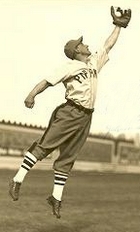Felix Penso
Ballplayers Wounded in Combat
| Date and Place of Birth: | August 19, 1915 Seattle, WA |
| Date and Place of Death: | August 20, 1993 Leander, TX |
| Baseball Experience: | Minor League |
| Position: | Outfield/Pitcher |
| Rank: | Sergeant |
| Military Unit: | 38th Armored Infantry Battalion, 7th Armored Division US Army |
| Area Served: | European Theater of Operations |
Felix J. Penso, Jr., the son of Italian immigrants, Felix and Mary
Penso, was born on August 19, 1915, in Seattle, Washington. He graduated
from Queen Anne High School in Seattle, in 1934, and both Felix and his
younger brother, John, played semi-pro baseball in and around Seattle
following their high school days.
John, an infielder, signed with the Moultrie Packers of the Class D
Georgia-Florida League in 1937, while Felix pitched his team to the
Washington State semi-pro championship. In 1938, Felix signed with the
Chicago White Sox organization and played for the Yakima Pippins of the
Class B Western International League. With his brother playing for the
Spokane Hawks in the same league, Felix pitched in only five games, but
played 117 as an outfielder and batted .309. Good enough to be an
all-star selection.
In 1939, the 23-year-old played 126 games with the Pippins, batted .275
and hit seven home runs. During the winter of 1939/1940, he played
professional basketball in Seattle with Tigers' pitcher Fred Hutchinson.
Penso split the 1940 season with the Pippins and the Vancouver Capilanos
in the same league, and joined the Seattle Rainiers for spring training
in 1941.
His time spent with the Rainiers was cut short, however, as military
service beckoned in March. Penso was stationed at Fort Knox, Kentucky,
where, on July 19, 1943, he combined with Cardinals' hurler, Johnny
Grodzicki, to beat the Louisville Colonels, 6 to 5, in a relief fund
benefit game.
Penso attained the rank of sergeant and served in Europe with the 38th
Armored Infantry Battalion of the 7th Armored Division. On September 15,
1944, the battalion crossed the Moselle River in France, and began an
attack the following day on enemy positions at Sillegny. From the 16th
to the 21st, the battalion suffered heavy casualties. Sergeant Penso was
awarded the Combat Infantryman Badge for his exemplary conduct in action
against the enemy on September 19, 1944. He was later awarded the Bronze
Star and received the Purple Heart for wounds received in combat.
In August 1945, with the war in Europe over, Penso was able to focus on
baseball again. Although he had played most of his professional career
as an outfielder, he was proving very successful as a pitcher (as he had
in his younger days) for the 7th Armored Division, hurling four
victories to give them the first-half of the Seventh Army southern
league title in Germany.
Penso was back in organized baseball in 1946, pitching for the Fort
Worth Cats and the Tulsa Oilers in the Class AA Texas League. In 36
appearances he was 6-6 with a 2.54 ERA. He remained with Tulsa in 1947,
working mostly as a relief pitcher, and joined the Austin Pioneers of
the Class B Big State League mid-way through the 1948 season.
In 1949, the 33-year-old was signed by the Bryan Bombers of the Class C
East Texas League as a player/manager and to help the young players to
develop. But after a poor start to the season (the Bombers were in sixth
place), he was released on May 21. Penso pitched for the Clovis Pioneers
of the Class C West Texas-New Mexico League and the Longview Texans of
the East Texas League, before retiring from the game zt tgher end of the
1949 season. Penso made his home in Austin, Texas, and during the 1950s,
he played in a number of old-timers games.
Felix Penso passed away in Leander, Texas, on August 20, 1993. He was 78
years old.
Date Added January 6, 2018
Can you add more information to this biography and help make it the best online resource for this player? Contact us by email
Read Baseball's Greatest Sacrifice Through The Years - an online year-by-year account of military related deaths of ballplayers
Baseball's Greatest Sacrifice is associated with Baseball Almanac
Baseball's Greatest Sacrifice is proud to be sponsored by


